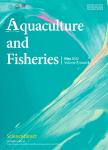Genomes of major fishes in world fisheries and aquaculture: Status, application and perspective
作者机构:Department of BiologyUniversity of Nebraska at OmahaOmaha68182USA Wuxi Fisheries CollegeNanjing Agricultural UniversityJiangsuWuxi214081China
出 版 物:《Aquaculture and Fisheries》 (渔业学报(英文))
年 卷 期:2020年第5卷第4期
页 面:163-173页
学科分类:0710[理学-生物学] 0830[工学-环境科学与工程(可授工学、理学、农学学位)] 07[理学] 0908[农学-水产] 0707[理学-海洋科学] 071002[理学-动物学] 0713[理学-生态学]
基 金:This publication was made possible through funding support from the National Science Foundation(DBI-1919574) the University of Nebraska at Omaha.
主 题:Fish genomics World aquaculture Fisheries management Genomic selection Intelligent system
摘 要:Capture fisheries and aquaculture provide a significant amount of high-quality protein to human beings and thus play an essential role in ending global hunger and malnutrition.The availability of tens of hundreds of fish genomes and the advances of genomics have allowed addressing many challenging issues such as overfishing and germplasm degradation faced by fisheries and aquaculture.In this review,we describe the current status of genomics in fisheries and aquaculture,with an emphasis on 14 species of fish that are considerably important to global fisheries and aquaculture,in the context of genome sequencing and assembly,annotation,GC contents,and repeats.The majority of these genomes are assembled at the chromosome level and annotated with proteins and pathways,with functional relevance to fisheries and aquaculture,such as environmental adaptation and phenotypic variation.We summarize potential genomic applications in fisheries and aquaculture that are related to assessment and use of genetic resources,disease resistance,growth and development,sexual determination,and fisheries management.Although much progress has been achieved in genomic application to fisheries and aquaculture,the full potential remains to be explored and reaped.We discuss the challenges and perspectives of genomics in translational aquaculture and fisheries,which include genome assembly and annotation,genomic selection and breeding,genomics in fisheries management,and integrated artificial intelligence systems.In the coming decades,we anticipate the applications of genomic techniques such as genome editing and genomic selection,along with the use of emerging intelligence systems,in aquaculture and fisheries will contribute significantly to genetic improvements of farmed fish and sustainable exploitation of fishery resources,which consequently lead to eradicating global poverty by 2030,an ambitious goal set by the United Nations.



